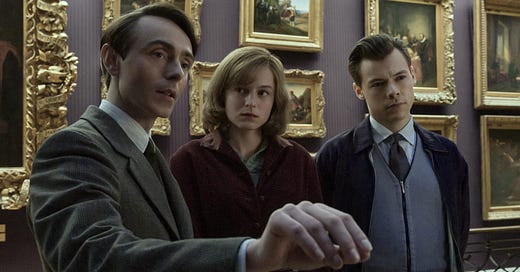Heartland: My Policeman
Harry Styles continues his quest for movie stardom in this period love triangle that's sensitive and tragic.
Once upon a time when I was a newspaper entertainment editor, I made it a point to keep up with all things pop culture. Movies was always my bag, but I wanted to be familiar with musicians, singers, artists from various genres and disciplines. I read magazines (remember those?) and what was then online.
Lotta water under that bridge now, so these days there are often very famous people with whom I’m not familiar. Harry Styles is a good example. He’s an English singer who’s now trying hard to break into movie stardom, with smaller parts in “Dunkirk” and “Eternals,” and feature roles in “Don’t Worry, Darling” that came out just a couple of weeks ago, unseen by me as yet, and now “My Policeman.”
The latest is what I’d call a bonafide star-making role, as this period romantic triangle is built entirely around him. He plays Tom Burgess, a young policeman who woos a brainy schoolteacher, Marion (Emma Corrin), and eventually marries her, despite not being intellectually or culturally her match. She would seem better suited to marrying Patrick (David Dawson), a museum curator and mutual friend who introduces them to art, musical recitals and history.
The twist is that Patrick and Tom began their own affair a bit before Tom did with Marion. This was not a very safe thing to do in 1957 England, where you could literally be sent to jail and have your career ruined for being homosexual. As part of the force responsible for those accusations, Tom is especially vulnerable to keeping things quiet. He actually marries Marion mostly as a cover to advance his career, though he does seem to have genuine feelings for her.
Of course, Marion is no dolt and eventually she’s going to figure things out.
A framing device is set roughly 40 years later. Patrick is now an invalid following a stroke, and for some strange reason Marion has decided to bring him to her and Tom’s ocean cottage in Brighton to take care of him. This is against Tom’s objections, who refuses to even speak to Patrick, spending most of his time walking along the beach with his dog.
Marion, Tom and Patrick are played by Gina McKee, Linus Roache and Rupert Everett, respectively, in the older section. They’re all a bit young to convincingly play 70-ish retirees, but inhabit the roles with conviction. Everett has the toughest performance, since his character can barely speak and he has to express vast emotions from a bed or stationary wheelchair.
Something obviously big happened to bring them to this state, and Marion gradually discovers this by reading through Patrick’s journals, essentially narrating the younger section.
The film, directed by Michael Grandage from a screenplay by Ron Nyswaner, based on the novel by Bethan Roberts, is basically a showcase for Styles, who gets to wear lots of cool period outfits and brush his famous hair into a pompadour so high it should require a building permit. He’s the object of both Marion and Patrick’s gaze, the locus of their shared desire.
Styles definitely has the looks and swagger of a movie star; I think the acting skill is there but it’s not yet been finely honed as his voice. This film makes him a mostly reactive figure, so he has less opportunity for “big acting moments” than the other two thespians.
The contrast in the sex scenes between Tom and Patrick and those with Marion are so massive as to be almost comical. The boys grind and moan with wild passion, while the straight sex is given the old staid treatment of “five missionary pumps and premature orgasm.” Granted, Tom probably isn’t as emotionally invested in bedding Marion, but the movie takes the now-common line that heterosexuals are the less hotter couples.
We’ve seen this sort of story before about forbidden love in older times, so “My Policeman” isn’t exactly a fresh take. But it’s a sensitive and tragic portrait of a triangle of people all bound by love for each other, even if it’s often not expressed in a way that is healthy for their long-term happiness.





